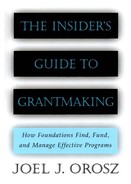Chapter Fifteen
The Ethics of Grantmaking
Henry David Thoreau no doubt would be amused by the irony of seeing his words hanging in full calligraphic glory on the walls of many grantmakers: “Philanthropy is almost the only virtue which is sufficiently appreciated by mankind” ([1854] 1973). Program officers frame the words and bask in Thoreau's approval, but a closer reading suggests that the sage of Walden was offering a tart criticism to the do-good tribe. Other virtues are underappreciated; they are better than they are generally understood to be. Philanthropy is almost the only one that is no better than it is perceived to be.
If Thoreau was right, there are many reasons for it. First of all, there is the simple fact that philanthropy does not have the same level of accountability as do other callings. Program officers are accountable to their officers and boards, of course, but they do not have constituents who can vote them out of office, or shareholders who can fire them for failing to turn an adequate profit. This freedom from accountability can give courage to be bold—but it can also give license to fall short of excellence.
There can be no denying that some program officers have taken that license. Whether unwittingly or uncaringly, these grantmakers do harm, surrender to arrogance, tell lies, become involved in conflicts of interest, lose touch with their spirit, miss big opportunities, and lapse into formulaic behavior.
